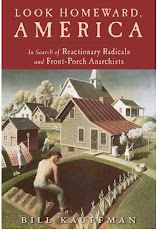By "journalism", the FTC means "newspapers" and by "encourage innovations" the FTC means stifle competition. Among the FTC's suggestions:
• Tightly limit what search engines and news aggregators (like Drudge Report) are allowed to report;
• Potentially define certain kinds of news reports as "proprietary facts" rather than events in the public domain;
• Rather than protect consumers against price-fixing (one of its missions), the FTC rallies around antitrust exemptions for newspapers that could help them monopolize news distribution;
• Redistributing wealth from individual taxpayers to old media, which would serve to bolster the coffers of newspapers while simultaneously reducing journalistic independence and truly creating a "state-run media".
Doug Ross has more
h/t
Scribal Terror
Added: from Coyote Blog
Here are just some quick highlights:
* Substantial narrowing of fair use, with particular focus on how search engines and other online sites (e.g. blogs) use and/or have to pay for access to news sites
* Expansion of news copyrights on breaking news – ie certain papers will own the copyrights to certain news events if they are the first mover on it
* Increased government funding of news organizations along multiple vectors, from subsidies to guaranteed loans to income tax checkoffs to lower postal rates to Americorps programs for for journalists.
* Simultaneously reduce private funding of journalism through taxes, including a tax on advertisers
* Shift the organizational model of journalism from profit corporations (which rely on satisfying individuals to get their revenue) to non-profit organizations dependent on the government for funding
* New taxes on and licensing of the Internet. New taxes on broadcast spectrum to subsidize print media (shifting money from media that are more hostile to the administration to print media and non-profits that are more sympathetic to the administration).
Here is the intro that was missing from the report: “The New York Times and Newsweek can’t figure out a profitable business model in the Internet age. We propose the government step in with all means at its disposal to limit competition to these print media companies and create new government subsidies for their business. Once their companies’ profitability is absolutely dependent on these government mandates and subsidies, the Federal government will have a powerful source of leverage to protect itself from criticism in these outlets. Once we have this situation in place, we will have a strong inventive to quash more independent outlets and maximize the market share of media companies beholden to the government. In a large sense, our recommendations build off the success of the tobacco settlement experiment, where a few large companies agreed to pay the government large percentages of their future profits, and then the government worked diligently to quash new tobacco competitors to maximize the market share of those companies paying it settlement money.”
Subscribe to:
Post Comments (Atom)





No comments:
Post a Comment